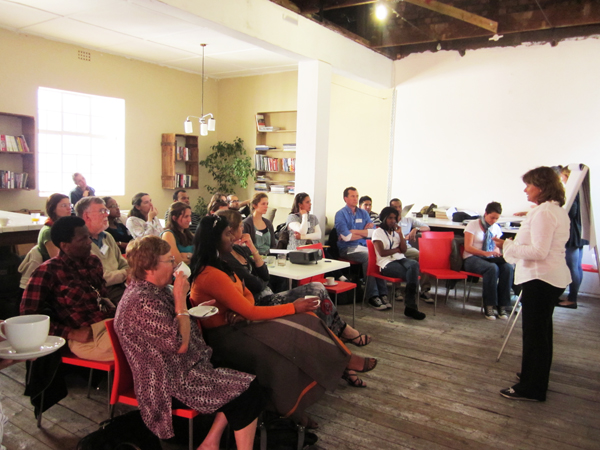Millions of textbooks to South African students-pushing the frontier of collaborative publishing

"We are opening" is the meaning of the Nguni word "Siyavula" and does a good job of describing the mission of the organisation of the same name, based in Cape Town. What has become a self-sustaining social enterprise started ten years ago when a group of ambitious students gathered at the University of Cape Town to answer a call from other students who were missing critical texts to pass their final science exams.
The goals were simple: make these texts available to students and have them remain permanently free in the future. With this in mind, the project initiated by Mark Horner was named the Free High School Science Texts (FHSST). In its early phase the volunteer physics students set out to answer a direct concern. Soon they realized they made a big difference to a large number of people. The project grew almost naturally and the content they produced was shared around the world.

Siyavula | Photo credit Siyavula
Since then, Siyavula was born and continues with the same mission but with a broadened scope. Not only were the number of titles and school grades expanded, they also opened up new ways to distribute educational textbooks to children in South Africa online. Siyavula are now using Booktype to enable community contributions and improve publishing of these textbooks.
Phones are easier to get than books, so publish to phones
Considering how poor the conditions are in many schools and homes in South Africa, digital formats, particularly those available for mobile phones, are a major step forward for education. Nicola du Toit from Siyavula states: "Being able to access quality material for free on their mobile phones means students can learn despite the poor state of their schools and they can access these materials from home, too. The mobile access thing is huge."
Collaboration shifts to the web
The method of collaborative writing, which was present from the very first workshop in 2002, is still how the materials are produced today. For the past few years the so called "textbook sprints" have brought South African graduate students and educators together, to participate in the collective writing process that ends in the production of a textbook. So far they have been working with students and professors from Australia and the U.K., American universities, and South African universities including the University of Cape Town, the University of Stellenbosch and Rhodes University.

Collaborative writing | Photo credit Siyavula
Publishing online brings students and educators together
Under normal circumstances a long and laborious series of edits between only a few individuals is sent back and forth from computer to computer before a textbook is finalized and ready for print. What is new is that once the participants return from the intensive collaborative workshop, they continue updating the materials online. By taking advantage of an online community, students can always access the most relevant information instantly. The continual maintenance keeps the textbooks "alive" in a way that education has never seen before. By mixing writing workshops with online collaboration, Siyavula initiated an amazing process that has the potential to upturn the arduous process of producing textbooks in the future.
Changing the future of an individual or the world
With a total of five workshops under their belt, Siyavula's community multiplies each time they facilitate a project. They have received thousands of messages from eager educators and students whose lives changed through the program. The feedback regarding their work is more than gratifying. One student told them that by using Siyavula's textbooks she passed her final school year and went on to higher education at the University of Johannesburg. "The idea that high quality material can be made available for free is a paradigm shift for many!" states Nicola. It seems too good to be true or hard to believe that positive change can happen for free.
In the coming years Siyavula plans to expand their selection of textbooks. Their focus is currently mathematics and science but they plan to offer other subject areas. Building sustainable communities around each text is another challenge that allows them to expand and maintain preexisting texts. Siyavula innovatively applies the open and collaborative nature of the web to a very real problem that exists within the educational system in South Africa. It may be no wonder if projects like Siyavula influence the way the rest of the world views learning in the future.
- For the latest information on Booktype join the Booktype Pro mailing list here.
